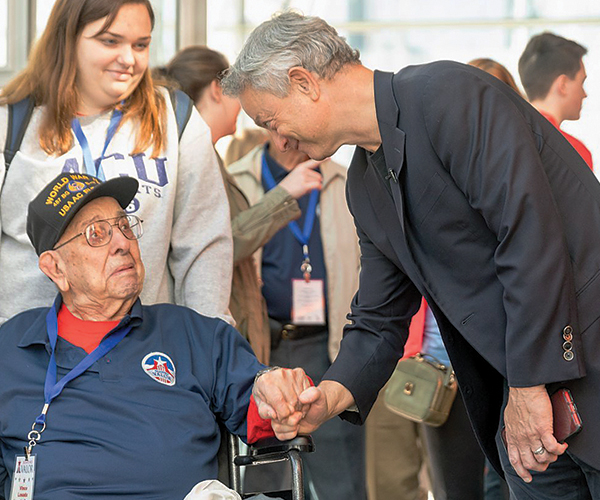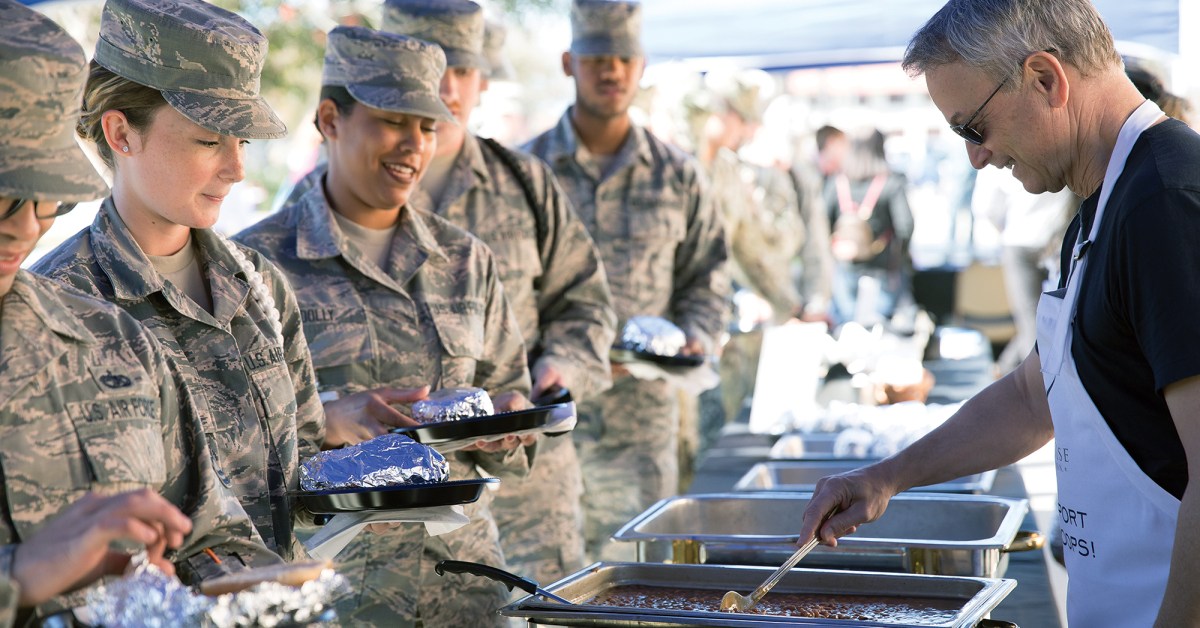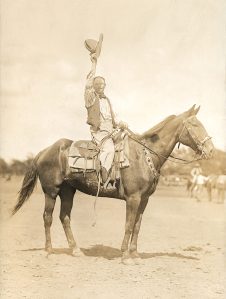
Respect for American veterans is an inherited trait for Gary Sinise. Members of the acclaimed actor’s immediate and extended family have served in the military for more than a century. Listening to their stories of service, Sinise developed a deep respect for those who’ve worn the uniform. That reverence grew into action as he found ways to help veterans. In 2011 the actor established the Gary Sinise Foundation, which provides programs, services and events for wounded veterans, first responders and their families, including mortgage-free “smart” homes for veterans with severe disabilities. The charity has since raised more than $200 million. Military History recently reached out to Sinise, who shared the spirit behind what he does for America’s veterans.
You have veterans in your family. What does their service to our country mean to you?
My grandfather Daniel Sinise served in the U.S. Army as an ambulance driver on the front line in France during World War I. He and my grandmother raised three boys. My uncles Jerry and Jack served in World War II, and my father Robert served in the Navy in the early 1950s during the Korean War. I met my wife, Moira Harris, in the 1970s, and her two brothers and her sister’s husband all served in the Army during the Vietnam War.
So much of what I have tried to do comes from having veterans in my own family. It all starts there. I was in high school during the Vietnam War, and when I met Moira’s brothers and brother-in-law shortly after graduating, their sharing of their experiences with me really opened my eyes, and I wanted to find ways to support veterans locally in the Chicago area. Getting to know them in turn made me think more about the veterans in my own family and have a greater appreciation for what my grandfather and my uncles went through in World Wars I and II. I am proud of my grandfather, my uncles, my dad and Moira’s family for having served our country.
What prompted you to contribute your time and energy to veterans’ causes?
While serving as the artistic director of the Steppenwolf Theatre in Chicago in the 1980s, I began looking for plays to direct that would reflect the Vietnam experience and stumbled across an ad for a play called Tracers. It was written and performed by Vietnam veterans, based on their experiences before, during and after the war. We were able to secure the rights. I wanted so much to honor our Vietnam veterans, especially those in my own family, with a great production. The play opened in February 1984, and it was an immediate hit. Throughout the rest of the ’80s and into the ’90s I supported Chicago area veterans’ groups in various ways. I’m proud to have played a role back then in raising funds and awareness to build the Lansing Veterans Memorial in Illinois.

Ten years later, as with Tracers, I felt the role of Lt. Dan Taylor in Forrest Gump was a way to honor our nation’s Vietnam veterans. From those early days, and now through the Gary Sinise Foundation, I am continually inspired when I’m in the presence of our incredible servicemen and servicewomen. They have welcomed me into their community, and I am honored by that. I’ve seen firsthand their extraordinary dedication. They and their families are the reason I continue to serve. Whether visiting our troops in war zones, in hospitals or across our nation, putting on hundreds of concerts with my band or helping to raise money, along with donating my own personal income, for several veteran/first responder programs and support nonprofits, having spent countless hours away from my family, it has all been part of a driving passion to give myself wholeheartedly to this service life.
How long have you been involved in such causes?
It began in the early ’80s with my support of Vietnam veterans’ groups and the creation of Vets Night, a program offering free dinners and performances to veterans at the Steppenwolf. Ever since I have been dedicated to our nation’s active-duty defenders, veterans, first responders, and their families.
‘It became clear my journey was now a lifelong service mission, and everything came together in June 2011 with the launch of the Gary Sinise Foundation’
How did your portrayal of Lt. Dan shape your perspective?
I saw the role as a way to honor Vietnam veterans. Lt. Dan was a soldier to the core, tried-and-true. He wanted to serve and have a long career in the military. When he was wounded, that was all taken away, and like so many Vietnam veterans he withdrew into the shadows. I believed our military men and women could relate to him and his passion to serve our nation. But the unique thing about Lt. Dan, unlike so many stories that had been portrayed about Vietnam veterans, is that he moves on and is successful in life. He puts his war experiences behind him, mentally and physically, and is standing up again by the end of the film.
A month after Forrest Gump opened, I received an invitation to attend the Disabled American Veterans convention in Chicago, on Aug. 21, 1994. They presented me with the National Commander’s Award for having portrayed a wounded veteran in a positive way and brought the wounded veteran back into the consciousness of the American people. I was humbled and moved beyond words by the reaction I received—thousands of veterans and their family members applauded me for having played a part in a movie. Little did I know how significant the role of Lt. Dan and that moment would become in my life.
How did you prepare for the role?
The experiences I had had in the ’80s with Vietnam veterans, and the relationship I had with the Vietnam veterans in our family, had prepared me somewhat already. I was committed to playing the role as honestly as I could because of the veterans I knew. I did do some research on what it would be like to go through life without legs, confined to a wheelchair. And I read the book Fortunate Son, by Lewis Puller Jr., son of the famous and highly decorated Marine Lt. Gen. Lewis “Chesty” Puller. The younger Puller lost both legs in Vietnam and struggled terribly afterward. Sadly, unlike Lt. Dan, he lost his battle with the demons and took his own life in May 1994, two months before Forrest Gump opened.
Did the Sept. 11, 2001, attacks change your perspective?
After the tragic and devastating attacks I began devoting much of my time to supporting the men and women answering the call to duty. In some ways the veterans support work I had done in the ’80s and ’90s prepared me for a new level of service. I began volunteering my time with the USO and many other nonprofits supporting our nation’s heroes. It became clear my journey was now a lifelong service mission, and everything came together in June 2011 with the launch of the Gary Sinise Foundation.
How did the Lt. Dan Band come to be?
I started playing music in fourth grade when I got my first guitar. I played all throughout school, but when I started the theater company, that took over all my time. In the late 90s I picked up playing again, and after September 11 I started doing USO tours. I would go out and shake hands, sign autographs, take pictures and visit with the troops. There were other musicians I would play with for fun.

Our first concert for the troops, in Chicago in June 2003, was just a little jam session, and we invited the local USO to bring over some troops for pizza and music. I went to Iraq a few weeks later, and Kid Rock was on that tour, rockin’ for the troops. I wanted to do more than shake hands and take pictures, and after a half dozen “handshake tours” that year the USO agreed to let me take a band on a tour. It’s now been more than 530 concerts, and we’ve been all over the world. The band is a program of the Gary Sinise Foundation [raising money for disabled veterans].
What prompted you to co-found Operation Iraqi Children?
During my second USO tour of Iraq in 2003 I visited schoolchildren at Al bu Hassan School in Balad. Only few pencils, sheets of paper or books were available, and I was inspired to action. When I returned home, I went to the principal at our children’s school and asked if we could have the kids bring in supplies to donate to the Iraqi children. I shipped 25 boxes of supplies to service members at the base near the Iraqi school, and they took them out to the children.
A year later I teamed up with renowned author Laura Hillenbrand to found Operation Iraqi Children, its mission to ship school supplies to U.S. troops for distribution to Iraqi children. Our motto was “Helping Soldiers Help Children.” We became a program of People to People International in Kansas City, Mo., run by Mary Eisenhower at the time. Year after year we expanded to include Afghanistan, Djibouti, Haiti and the Philippines, changing the name to Operation International Children. The program lasted for nine years and sent hundreds of thousands of school supply kits to troops for distribution. It was also a way to support our troops by giving them gifts to give, much like the GIs handing out chocolate to the German children at the end of World War II.
Why did you launch the Gary Sinise Foundation?
I wanted to do more for the men and women who defend our country and protect our cities, and having been involved with so many veterans and first responder support organizations, I knew that starting my own was the next step. In 2011 we established the foundation to serve our nation by honoring our defenders, veterans, first responders, their families and those in need. With the support of the American people I have been able to raise additional funds, expand programs and hire a great team to carry on the mission 24/7, which allows us to provide more of the services that support our defenders and families.

Do you recall any particularly meaningful interactions with veterans?
There have been so many over the years. In my book Grateful American: A Journey From Self to Service I wrote about the veterans and families I have met over the years, people whose resilience has inspired me to do more and moments on this journey that have affected me and changed me.
How does it feel to be an honorary Navy chief?
In 2012 I was invited to Washington, D.C., to the Navy Memorial and Naval Heritage Center to be named an honorary chief petty officer. Our youngest daughter was going to school in D.C., and I remember walking with her to the ceremony. Fleet Master Chief Michael Stevens presented me with the plaque, and our daughter pinned me. It was a wonderful ceremony, with a full Navy band and all. Just a very proud moment.
Do you regret not having served in uniform?
At the time I graduated high school, the Vietnam War was just ending. It was not something I was going to do. When I met my wife’s brothers, and I learned more about the Vietnam experience and what it was like for them, I felt guilty that I had not paid much attention when I was in school. I suppose out of that guilty feeling arose a commitment to do something to help our veterans. Those early seeds grew into a full-time commitment. So I suppose I am trying to make up for not having served in uniform by giving back to those who did.
‘Less than 1 percent of our population actually defends the rest of the country, and we all benefit from their sacrifices as we enjoy the freedom they take an oath to protect’
What more needs to be done to support veterans?
Government can only do so much. I believe citizens have a role to play. After all, less than 1 percent of our population actually defends the rest of the country, and we all benefit from their sacrifices as we enjoy the freedom they take an oath to protect.
While there are many wonderful nonprofit organizations that need support (and the Gary Sinise Foundation is one of them), I always recommend the personal touch—to not only donate to military charities, but also go where the veterans, active-duty service members and families are, to shake their hands, give them hugs, entertain them, buy them a meal, listen to their stories and let them know that their service to our country is appreciated, and that we do not take their service for granted. They are our freedom providers, and I know that my freedom must be fought for and protected.
I am glad there are people willing to serve. Along with that service are challenges, as it is a dangerous business. If every citizen in every neighborhood, in every community, in every town and city in every state would make it a priority to seek out and identify the military families and veterans within those communities—stepping up to honor and serve those who may have special needs because of their service—the difficult issues and challenges facing our veterans would be greatly reduced. MH





